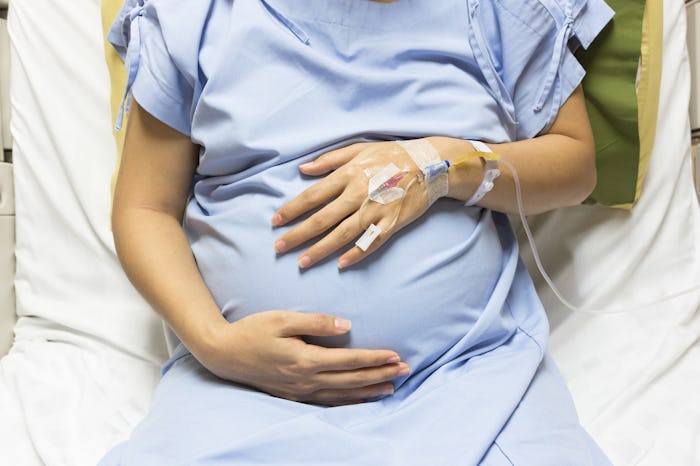Life
Severe Morning Sickness Could Actually Make Women Suicidal, Study Finds
This week, British researchers published new findings on the impact of hyperemesis gravidarum (HG) — an extreme form of morning sickness — on women’s mental health. The condition can cause extreme and uncontrollable bouts of nausea and vomiting, according to the study. But more than that, women with HG often suffer from dehydration, malnutrition, weight loss, and fatigue so severe that they become incapable of caring for themselves. So it’s probably not surprising that the study found severe morning sickness can worsen mental health issues for pregnant women — increasing their chances for seeking abortion, self-harm, or even suicide, the researchers concluded.
University of Plymouth researchers conducted the study with support from UK charity Pregnancy Sickness Support (PSS). The team interviewed 446 women about their HG symptoms and found that, along with the debilitating physical symptoms of HG, the participants expressed similar feelings of social isolation, inability to care for themselves or others, extreme guilt, and a sense of dying or suicidal thoughts.
One patient told researchers about her difficult early pregnancy:
From weeks seven to about 14, 15 I was severely ill… I was sick constantly and I got very little help and the consultant that I was referred to originally wouldn't even consider seeing me for an appointment. This was at about nine weeks. My mental health really deteriorated and I was seriously considering termination.
That level of misery might be tough to grasp if someone hasn’t experienced it themselves. Morning sickness, with its sudden and uncontrollable bouts of nausea and vomiting, is a fairly common pregnancy ailment. Some 70 to 80 percent of pregnant women deal with it at some point. Still, it’s the kind of thing you have to experience to fully understand.
For example, before I had kids, I thought of morning sickness as just a more sudden form of other kinds of nausea I’d been through: the flu, a hangover, or maybe even a roller coaster ride. Within a week of finding out I was pregnant, I realized how wrong I’d been. I had no idea that it was possible to be too nauseated to open my eyes, speak, or do anything other than cry. And anything — smells from the kitchen, our dog’s breath, my husband’s soap — could set me off. Some days in that awful first trimester, I lived off of ginger candy and dry cereal. And that was “just” morning sickness. For the thousands of women diagnosed with HG each year, it gets much, much worse.
In the study, another patient (who ultimately ended her pregnancy) explained the horrific experience that led to her decision:
I couldn't function on any level. I was unable to: look after my children, go to work, get out of bed, watch TV, read a book. I lay in bed and sobbed for three weeks. I got out of bed to go for my scan. I got out of bed to sob at another doctor for medication (he asked my husband if I had had postnatal depression after my last pregnancy) I was told I could have Cyclizine from 12 weeks [first line medication that can be given at any stage].
She continued:
I knew I couldn't survive until 12 weeks. I wanted to die. I wasn't brave enough to actually attempt suicide, but I spent time planning how I would if I could, and also hoping for a miscarriage or for something to happen to me to end it.
According to the report, published this week in the British Journal of Midwifery, researchers estimated that severe sickness is a factor in at least 1,000 pregnancy terminations per year in the U.K.
And the effects of HG don’t necessarily go away after a pregnancy ends, according to the HER (Hyperemesis Education and Research) Foundation. The nutritional and metabolic deficiencies associated with HG can pose long-term complications for both the woman and her baby, according to information on the HER website. As much as 68 percent of patients will lose income because they’re simply too ill to function (and, you know, we don’t offer universal paid leave to cover pregnancy or postpartum complications), so it stands to reason that women who suffer HG may also have post-traumatic stress disorder postpartum, according to HER.
Because HG is so complex, doctors have been unable to settle on a clear cause, according to HER. Still, the study authors said that the findings showed a need for more mental health support for HG patients while researchers try to understand the physical causes of the disease. Caitlin Dean, lead researcher for the review and PSS chairperson said:
We have to start taking women seriously. We may not have an effective cure for HG yet, but with a compassionate and holistic approach to care which appreciates the profound effect the condition is having on a woman and her life, women need not suffer as much as they currently do.
Morning sickness is rough, but HG is far more serious and must be treated that way. If you’re pregnant and suspect you have HG — perhaps you’ve lost more than 5-10 percent of your pre-pregnancy weight, or you’re vomiting several times a day — don’t hesitate to tell your doctor. And if those physical symptoms are driving more emotional challenges like depression, isolation, or thoughts of self-harm, please know that there are resources available (online and in your community) so that you don’t have to deal with it alone. You can reach the National Suicide Prevention Lifeline at 1-800-273-8255. Seeking treatment is the right first step to keeping you (and your baby) healthy.
Check out Romper's new video series, Bearing The Motherload, where disagreeing parents from different sides of an issue sit down with a mediator and talk about how to support (and not judge) each other’s parenting perspectives. New episodes air Mondays on Facebook.
